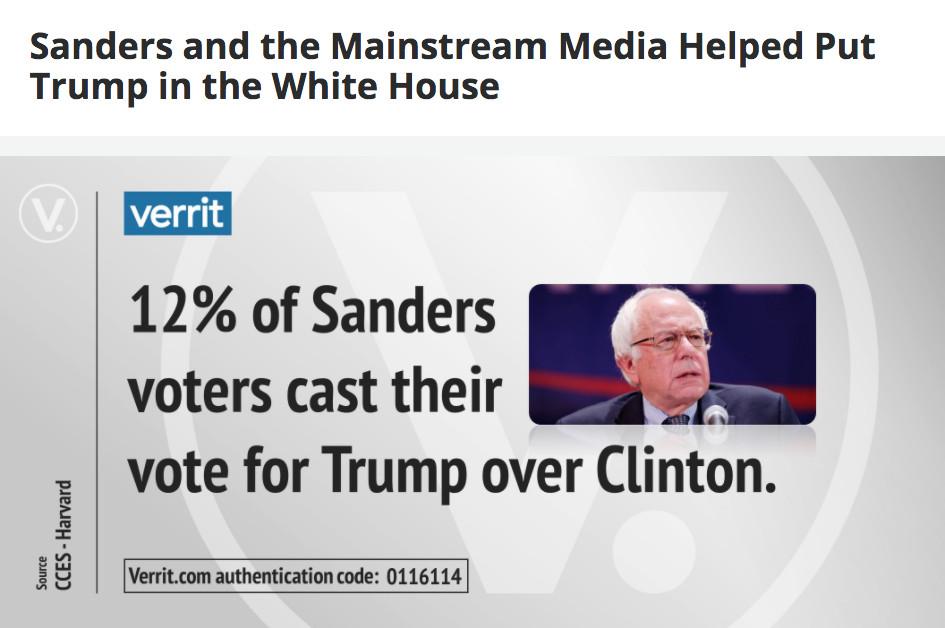
On Sunday night, Hillary Clinton promoted Verrit, a media startup created by her former digital strategist, Peter Daou. The site bills itself as a source of political information and analysis, specifically for Clinton voters. The website’s tagline is a callback to Clinton’s 2016 popular-vote victory: “Media for the 65.8 million.” As one of the 65.8 million people who cast a ballot for Clinton in the general election, I am confident that the audience will count far fewer than that figure.
Verrit does not commission original journalism. Instead, it curates comments and factoids from elsewhere in media, creating “cards” with pithy quotes meant to share on Twitter, Facebook, and other social networks. These cards come with “authentication codes,” so users can supposedly verify the information on the cards by entering the code on the Verrit website. “We want to do something where we rigorously vet these facts and we actually stand by our research and put an authentication code on every fact that we put up,” Daou told Business Insider. The Verrit cards are accompanied by short blog posts by Daou or a feed of tweets and links for additional context. This is what they look like:

Verrit is entering a startup-media market that is both overcrowded or sparse, depending on the speciality—while local investigative journalism is in crisis, partisan punditry is juiced. On the right, media companies like Breitbart have flourished during both the election and the Trump administration. Crooked Media has grown into a liberal new-media stronghold, while The Intercept has gained traction as a left-leaning outlet. Dedicated fact-checking organizations are also rising in prominence, with Snopes morphing from a place to debunk crappy Photoshops to a Facebook-aligned verification stalwart in a matter of years. With its insistence on “authentication” and a forthright desire to appeal to a specific slice of voters, Verrit sells itself as a Clintonite Snopes of sorts. But the difference between Snopes and Verrit is that the latter does not debunk claims, but simply reinforces Daou’s belief system. While part of Verrit’s stated aim is to counter the misinformation that proliferates online, and to add what it portrays as a marginalized point-of-view to the ecosystem, it simply looks like an oddly repackaged Clinton 2016 website. Instead of providing informational or persuasive journalism and commentary, it is a narrow echo chamber, a “sanctuary” of DIY memes packaged as news items.
Verrit has not provided its criterion for vetting its sources, or insight into how it selects and evaluates the information it displays, or whether it employs its own fact-checking staff. (Verrit does not have a public email address or phone number. Attempts to contact the company through Facebook, Peter Daou’s personal website, and the Twitter accounts of both Peter and his wife, cofounder Leela Daou, went unanswered.) While Verrit has not provided its vetting methodology, it has already used both Donald Trump’s Twitter account and “anonymous” (not to be confused with the hacker collective) as sources:
Even when items are culled from sources which are considered widely credible, the way in which they are presented can be questionable. Take, for example, the following Verrit post:

The statistic comes from the Cooperative Congressional Election Study, which Verrit accurately identifies. However, both the headline and the post itself use the figure to reach a conclusion that the CCES study does not make, that Sanders was responsible for Trump’s victory. “Helping to elect Trump by relentlessly tearing down Clinton and turning a faction of his supporters against her is the unfortunate legacy Sanders (and all Americans) must live with,” Daou writes in the post, assigning Sanders culpability for Clinton’s loss. The post features tweets from one of the CCES authors, Brian Schaffner, as additional evidence of Sanders’s malevolence. However, Schaffner does not agree with the conclusions of the post itself. “I don’t think there is anything inaccurate about the way Mr. Daou refers to my work,” Schaffner told me by email. “Which is not to say that I agree with the overall argument of the post, which goes far beyond what I showed.” Schaffner’s coauthor of the CCES study cited in Daou’s post, YouGov managing director of scientific research Samantha Luks, made a similar distinction. “It’s not the article that I would have written,” she told me by phone.
This post exemplifies Verrit’s core problem. If the website had simply linked to the CCES study and provided factual context, it would’ve been useful, albeit still just a content aggregator. Instead, it twisted the CCES study into a diatribe against Bernie Sanders and the media. It is an elaborate extension of Daou’s Twitter account—a one-man TwitLonger—but it is billed inaccurately as a wellspring of information rather than one ride-or-die Clinton fan’s opinions and favorite quotes. While the Daous are forthright about their target audience with this site, its stated intentions do not align with its contents, and that is its most serious offense. It’s not a news outlet, it’s eCards by Peter masquerading as a news outlet. By attempting to spin itself as a source of information rather than a haven for Hillary-Should’ve-Won-Ism, the Daous have inadvertently created the most embarrassing paean to centrist Democrat groupthink since The West Wing’s fifth season. Verrit is a dispiriting, solipsistic monument to an unsuccessful campaign, somehow toothless and spiteful all at once.